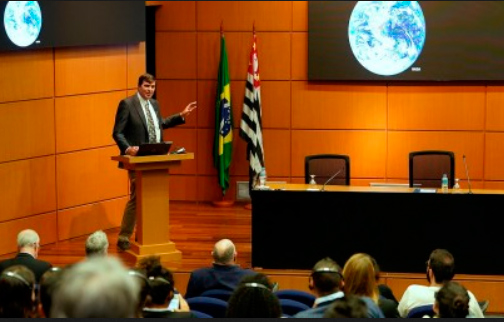

The event took place at FAPESP on August 30 (photo: Phelipe Janning/Agência FAPESP)
Alex Ruane delivered the 7th FAPESP Lecture 2024 on “Climate Change and Food Security”
By José Tadeu Arantes | Agência FAPESP – Current trends are incompatible with a sustainable and equitable world; food systems remain vulnerable to climate risks; and climate change projections indicate growing challenges – these were the main warnings proffered by Alex Ruane in the 7th FAPESP Lecture 2024, which was entitled “Climate Change and Food Security” and took place in São Paulo, Brazil.
Ruane is a researcher at NASA, the US National Aeronautics and Space Administration, where he is Co-Director of the Climate Impact Group, and an Associate Research Scientist at Columbia University’s Center for Climate Systems Research in New York. He was Coordinating Lead Author for Chapter 12 of the Sixth Assessment Report (AR6) of the Intergovernmental Panel on Climate Change (IPCC), which addressed the risks of climate change and its consequences.
His lecture highlighted the importance of a proactive approach to mitigation and adaptation, with crucial choices being made now and in the next ten years. Moreover, he said, “our agricultural models can help us start to enable and implement mitigation and adaptation actions that are feasible, equitable and fair”.
In this context, he stressed, “the world is asking the agricultural sector to take on a quadruple challenge: we must sustainably increase production to provide healthy food for growing and developing populations, adapt to climate change and ongoing climate extremes, mitigate emissions from agricultural lands, and maintain financial incentives for agriculture”.
He presented data showing that the ten years between 2011 and 2020 were 1.1 °C warmer on average than the period between 1850 and 1900. If the current trend does not change, in the coming decade the world could surpass the 1.5 °C threshold above which managing the climate crisis will become exceptionally harder, he said, noting the IPCC’s five scenarios ranging from the most optimistic, with global warming below 1.5 °C, to the most pessimistic, with a rise of 4 °C or more in the global average temperature.
In the worst-case scenario, the frequency of extreme heat events could rise by a factor of 40, with temperature increases exceeding 5 °C, extreme rainfall tending to occur 2.7 times every ten years (instead of only once), and 30% more precipitation.
Agricultural production and food security are affected not just by global warming but also by the increasing frequency of extreme events due to the climate crisis, with a direct impact on livestock and crops.
Ruane repeatedly emphasized the key role played by climate and agricultural models in planning for the future. “These models enable governments and other stakeholders to develop mitigation strategies,” he said, citing the example of the Agricultural Model Intercomparison and Improvement Project (AgMIP), for which he is Science Coordinator. Its mission is to achieve significant improvements to agricultural models, and to scientific and technological capabilities, for assessing the impacts of climate variability and change and other driving forces on agriculture, food security and poverty at local to global scales.
He also underscored the need for long-term investment to make the adaptations required to address climate change, and for policymakers and investors to start planning now so as to ensure that the necessary infrastructures and technologies are available in future.
The lecture also addressed the issue of social justice in the context of climate change. For Ruane, solutions to the climate crisis and food security challenges “should be fair and equitable, ensuring that the most vulnerable populations, who are most affected by climate change, receive the necessary support”. Social justice is not only an ethical issue, he said, but also a practical necessity to guarantee the sustainability of the solutions implemented.
He concluded by reaffirming the urgent need for action, stressing that the choices we make in the coming decades will be crucial to determine the fate of the planet and future generations. He encouraged the audience to think about innovative solutions and work together to tackle the challenges posed by climate change and food insecurity, emphasizing the need for collaboration by governments, private enterprise, civil society and the scientific community.
The session was opened by Marcio de Castro Silva Filho, Scientific Director of FAPESP, and Carlos Alfredo Joly, a member of the organizing committee for the 2024 FAPESP Lecture Cycle. The event was moderated by Jurandir Zullo Junior, a researcher at the State University of Campinas’s Center for Meteorological and Climate Research Applied to Agriculture (CEPAGRI-UNICAMP).
In his welcoming remarks, Silva Filho noted that while Brazil is the world’s third-ranking food producer behind the United States and China, 20% of the population of São Paulo, Brazil's wealthiest state, suffer from some degree of food insecurity, and food insecurity is severe for 3%. The good news, he added, is that FAPESP is working on a new program that will focus on food security and have synergies with existing initiatives.
A recording of the 7th FAPESP Lecture 2024, “Climate Change and Food Security”, can be watched at: https://www.youtube.com/live/gsnWaibumWo.
Republish
The Agency FAPESP licenses news via Creative Commons (CC-BY-NC-ND) so that they can be republished free of charge and in a simple way by other digital or printed vehicles. Agência FAPESP must be credited as the source of the content being republished and the name of the reporter (if any) must be attributed. Using the HMTL button below allows compliance with these rules, detailed in Digital Republishing Policy FAPESP.






